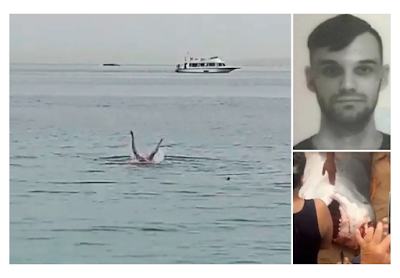Vladimir Popov- The major victim of shark attack story in Egypt
Because of the extensive media coverage of
shark attacks in recent years, these apex predators have frequently come to be
associated with misinformation and anxiety among people, especially tourists.
In Egypt, a tiger shark attacked and kidnapped a Russian who was snorkelling
close to the country's Red Sea resort. In the coastal areas of the Red Sea,
shark attacks are uncommon. But in 2022, shark attacks at Hurghada claimed the
lives of two ladies, one from Romania and the other from Austria. So shark attacks
are not an uncommon thing anymore in Egypt.
The shocking episode in which a Russian
man, Vladimir Popov, was kidnapped by a tiger shark off the coast of Egypt
brings to light the expanding problem of human-animal conflict in marine
environments. This episode is a sharp reminder of the need for shark awareness
and highlights the significance of taking the necessary precautions to avoid
similar encounters in the future. Consideration of the precarious equilibrium
between human activity and the natural environment is essential. When a
lifeguard from a neighbouring hotel sounded the alarm, others reportedly raced
to help the victim, but they were unable to get to him in time. Vladimir
Popov's body pieces were found inside the shark, proving to the authorities
that they had indeed caught the shark responsible for the assault on Thursday
at the Elysees Dream Beach Hotel which is a well-known beach town of Hurghada.
Later, the ministry announced that it had captured the shark and was studying
it in a lab to try to understand the circumstances surrounding the unusual attack.
This episode warned visitors to be cautious when swimming and to strictly abide
by any swimming bans issued by local authorities. The Red Sea Governor is
considering putting up nets at various beaches, resorts, and tourist
destinations to keep sharks away from swimmers.
Importance of Shark Awareness Day
Every year on July 14, Shark Awareness Day
provides a chance to raise awareness among the general public about the crucial
function that sharks serve in preserving a healthy marine ecosystem. We can
dispel myths and promote conservation efforts to safeguard both humans and
sharks by creating a greater understanding of these animals.
Major steps to avoid human animal conflict
Conflict between humans and animals
develops when human activities alter the habitats and activities of wildlife,
which may result in hazardous interactions. With regard to sharks, issues like
overfishing, pollution, and habitat loss have brought these magnificent animals
closer to shorelines and into contact with people. Conflicts and terrible
occurrences such as the one in Egypt have increased as a result of this. A
multifaceted strategy is required to prevent future human-animal conflicts and
guarantee the safety of both people and marine life. People can participate in
public education and awareness campaigns, improved safety procedures,
sustainable fishing methods, and giving these sharks a safe place to live
without human interference. You can also invest in a scientific and
collaborative study to gain a deeper understanding of shark behaviour,
migration patterns, and the effects of environmental changes on their
populations.
The recent shark attack in Egypt serves as
a sombre reminder of the critical need to address human-animal conflict.
Recognising the value of sharks in preserving a healthy ocean ecosystem and
taking the necessary action to avert future conflicts are both collective
responsibilities. We can strike a balance between human activity and the
preservation of our marine ecosystems by raising public awareness, putting
safety measures in place, using sustainable fishing methods, and creating
marine protected zones. Let's cooperate to promote a healthy connection that
benefits both our species and the planet we share, ensuring that people and
sharks can coexist.


Post a Comment